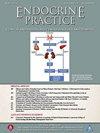Management Aspects of Medical Therapy in Graves Disease
IF 3.7
3区 医学
Q2 ENDOCRINOLOGY & METABOLISM
引用次数: 0
Abstract
Objective
Graves disease (GD) is the most common cause of hyperthyroidism. Treatment options include antithyroid drugs (ATDs), radioactive iodine, and surgery. In this review, we focus on the medical aspects of managing GD.
Methods
The authors conducted a literature review of PubMed to include studies and review articles on GD management, ATDs, long-term safety of antithyroid drugs, hyperthyroidism in pregnancy, Graves ophthalmopathy, and special circumstances related to hyperthyroidism.
Results
In adjunction to ATDs, medical management for GD also includes beta-blockers, glucocorticoids, and iodine containing agents. ATDs are currently the preferred option for initial management of GD, reflecting a shift in practice observed in the United States over the past 2 decades. ATDs in appropriate doses are well-tolerated and safe when used for longer duration, during pregnancy, and other circumstances discussed in this article. Routine thyroid function tests are important for monitoring. Thyrotropin receptor antibody plays an essential role in determining duration of treatment and assessing the likelihood of recurrence.
Conclusion
Medical management of GD with antithyroid drug is safe and effective. Long-term use beyond 24 months in patients with elevated thyrotropin receptor antibody is a reasonable alternative option to surgery and radioactive iodine due to higher rates of remission.
格雷夫斯病药物治疗的管理
目的:Graves病是甲亢最常见的病因。治疗方案包括抗甲状腺药物、放射性碘和手术。在这篇综述中,我们着重于格雷夫斯病的医学方面的治疗。方法:作者在PubMed上进行文献综述,包括Graves病的管理、抗甲状腺药物、抗甲状腺药物的长期安全性、妊娠期甲状腺功能亢进、Graves眼病及与甲亢相关的特殊情况的研究和综述文章。结果:Graves病的医疗管理除抗甲状腺药物外,还包括-受体阻滞剂、糖皮质激素和含碘药物。抗甲状腺药物目前是格雷夫斯病初期治疗的首选药物,这反映了过去二十年来在美国观察到的实践转变。适当剂量的抗甲状腺药物在较长时间、怀孕期间和本文讨论的其他情况下使用是耐受性良好且安全的。常规甲状腺功能检查对监测很重要。TRAb在确定治疗时间和评估复发可能性方面起着重要作用。结论:Graves病合并ATD的医疗管理是安全有效的。由于缓解率较高,TRAb升高的患者长期使用超过24个月是手术和RAI的合理替代选择。
本文章由计算机程序翻译,如有差异,请以英文原文为准。
求助全文
约1分钟内获得全文
求助全文
来源期刊

Endocrine Practice
ENDOCRINOLOGY & METABOLISM-
CiteScore
7.60
自引率
2.40%
发文量
546
审稿时长
41 days
期刊介绍:
Endocrine Practice (ISSN: 1530-891X), a peer-reviewed journal published twelve times a year, is the official journal of the American Association of Clinical Endocrinologists (AACE). The primary mission of Endocrine Practice is to enhance the health care of patients with endocrine diseases through continuing education of practicing endocrinologists.
 求助内容:
求助内容: 应助结果提醒方式:
应助结果提醒方式:


